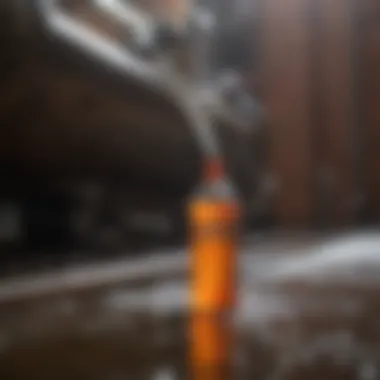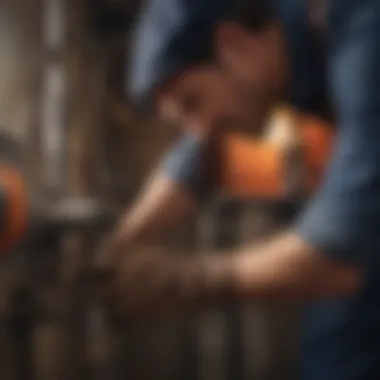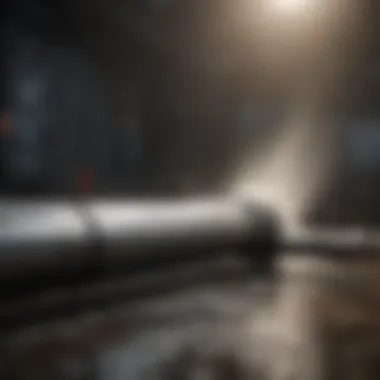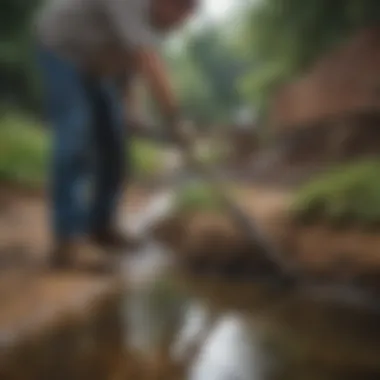Expert Guide to Clearing Clogged Pipes: Effective Solutions Revealed


Are you grappling with stubborn clogs in your plumbing system, hindering the flow of water and causing a headache? This detailed guide is here to rescue you from the clutches of blocked pipes. By delving into the common culprits behind these obstructions and exploring a repertoire of effective unclogging methods, you will gain valuable insights into maintaining a smooth and efficient plumbing system.
Common Causes of Blockages
Before venturing into the realm of unclogging pipes, it is essential to understand the roots of the problem. Issues such as accumulated debris, grease buildup, mineral deposits, and even tree root invasion can lead to pesky blockages in your pipes. Recognizing these common causes is the first step towards restoring the seamless operation of your plumbing system.
Methods for Unclogging Pipes
With the plethora of techniques available, from using simple household ingredients to employing specialized tools like drain snakes and hydro-jet cleaners, there's no shortage of options to tackle clogged pipes. Each method offers a unique approach to dislodging blockages and restoring proper water flow throughout your plumbing network. By exploring these methods in detail, you can identify the most suitable solution for your specific pipe-clearing needs.
From recognizing the warning signs of a looming pipe blockage to mastering the art of preventive maintenance, this comprehensive guide equips you with the knowledge and tools to address clogs swiftly and effectively. Say goodbye to sluggish drains and frustrating backups - with the insights gained from this guide, you'll be well-prepared to keep your plumbing system running smoothly and efficiently.
Understanding Clogged Pipes
The intricacies of comprehending clogged pipes play a pivotal role in the discourse of plumbing maintenance. Through investigating the core causes underlying pipe obstructions and recognizing the manifestation of potential issues, individuals can proactively address plumbing concerns. By delving deep into the anatomy of clogged pipes, one gains a profound appreciation for the intricacies of plumbing systems. Understanding clogged pipes equips individuals with the knowledge necessary to identify, troubleshoot, and mitigate blockages effectively, fostering a smoothly functioning plumbing infrastructure.
Causes of Pipe Blockages
Food Residue
Food residue, comprising remnants of cooking oils and food particles, emerges as a significant contributor to pipe blockages. The proclivity of food residue to solidify within pipes over time precipitates clogs, impeding the seamless flow of water. As a prevalent culprit in obstructed plumbing systems, food residue necessitates vigilant disposal practices to avert the accumulation of grease and food scraps within pipes. Mitigating the prevalence of food residue entails adopting conscientious habits to prevent grease buildup and sustain unimpeded water drainage.
Hair and Soap Scum
The confluence of hair strands and soap scum within pipes instigates blockages, disrupting the unobstructed flow of water. Hair possesses a resilient nature, entwining within pipe crevices and amalgamating with soap residue to form constrictive barriers. Mitigating the impact of hair and soap scum entails employing preventive measures such as drain screens to intercept hair and restricting the excessive use of soap products to curtail scum formation. Addressing the accretion of hair and soap scum within pipes is paramount to fostering efficient water drainage and circumventing plumbing complications.
Grease Build-Up
Grease accumulation within pipes precipitates blockages, attributed to the tendency of grease to congeal and adhere to pipe interiors. The viscous nature of grease promotes its entrapment within plumbing systems, impeding the seamless passage of water. Counteracting the progression of grease build-up mandates conscientious disposal methods to curtail the introduction of grease into drains. Implementing prudent practices to limit grease ingress into pipes is instrumental in preserving plumbing functionality and forestalling the onset of blockages.
Foreign Objects


Foreign objects, encompassing various non-biodegradable materials and debris, pose a threat to plumbing systems by impeding water flow and fostering obstructions. The inadvertent introduction of foreign objects into drains exacerbates the likelihood of blockages, necessitating proactive measures to mitigate their impact. Safeguarding pipes against foreign objects entails exercising caution in disposing of waste materials and refraining from introducing items that could obstruct plumbing systems. Vigilance in preventing foreign object ingress into drains is paramount to sustaining unobstructed water flow and averting plumbing dilemmas.
Signs of a Clogged Pipe
Slow Drainage
The gradual draining of water from sinks and tubs signals potential pipe obstructions, manifesting as a common indication of clogged pipes. Slow drainage alludes to the restricted flow of water within plumbing systems, indicative of underlying blockages. Recognizing the symptoms of slow drainage enables individuals to proactively address pipe obstructions, expediting remedial measures to restore optimal water flow. Addressing instances of slow drainage promptly facilitates the mitigation of blockages and preserves plumbing efficiency.
Foul Odors
Foul odors emanating from drains denote the presence of organic matter decaying within pipes, accentuating the occurrence of clogs. The unpleasant smell permeating from drains signifies the accumulation of debris and food remnants, contributing to pipe blockages. Mitigating foul odors necessitates implementing measures to eliminate decaying matter within pipes, such as employing natural cleaning solutions or seeking professional plumbing assistance. Addressing the root cause of foul odors within plumbing systems is essential to obviating blockages and fostering a hygienic environment.
Gurgling Sounds
Gurgling sounds resonating from drains denote air escaping through blockages within plumbing systems, indicative of clogged pipes. The presence of gurgling sounds signifies the formation of air pockets due to obstructed water flow, underscoring the existence of pipe blockages. Acknowledging the significance of gurgling sounds prompts individuals to investigate and resolve pipe obstructions promptly, restoring the unhindered passage of water. Attending to gurgling sounds expeditiously mitigates the impact of clogged pipes and upholds the operational integrity of plumbing systems.
DIY Methods for Unclogging Pipes
In the realm of plumbing, understanding how to effectively unclog pipes can deter costly repairs and maintain smooth water flow within the household plumbing system. The section 'DIY Methods for Unclogging Pipes' expounds on the significance of taking a hands-on approach to tackle pipe blockages. By providing step-by-step instructions and utilizing common household items, individuals can mitigate the inconveniences of clogged pipes promptly. Evidently, the ability to independently resolve pipe blockages not only saves time and money but also empowers homeowners to manage minor plumbing issues proactively.
Boiling Water
One of the simplest yet effective DIY methods for unclogging pipes involves using boiling water. Boiling water serves as a natural and non-toxic solvent that can dissolve organic matter like grease, soap residue, and food particles causing blockages. The process entails cautiously pouring boiling water down the drain in gradual increments to gradually break up and flush away the obstruction. This technique is ideal for mild blockages and regular maintenance to prevent build-ups in the pipes. When executed correctly, this method can restore proper water flow without the need for harsh chemicals or specialized tools.
Baking Soda and Vinegar
Baking soda and vinegar offer a formidable duo in combating pipe blockages due to their chemical reaction that generates foam, loosening debris and grime. By combining these household staples and pouring the mixture down the drain, the fizzy solution can dislodge obstructions and deodorize the plumbing system simultaneously. The foaming action serves to break down organic matter and residues that contribute to clogs. This natural and eco-friendly approach presents a safe and effective alternative to chemical-based drain cleaners, promoting a sustainable method for maintaining clear pipes.
Plunging Techniques
Employing plunging techniques is another practical method individuals can utilize to dislodge stubborn blockages in drains and pipes. By creating a tight seal around the drain opening and exerting forceful thrusts with a plunger, trapped materials causing obstructions can be dislodged and pushed through the pipeline. Plunging is highly effective for addressing blockages in sink and toilet drains and is a go-to solution for many homeowners when faced with slow drainage issues. This manual approach requires minimal equipment and is a valuable skill to have in handling common plumbing disturbances.
Using a Plumbing Snake


When conventional methods fall short in clearing pipe blockages, employing a plumbing snake can offer a comprehensive solution. A plumbing snake, also known as an auger, is a flexible tool designed to navigate through pipes, dislodging debris and blockages obstructing the water flow. By inserting the snake into the drain and rotating it to catch and remove obstructions, individuals can effectively clear challenging clogs within the plumbing system. Plumbing snakes come in various lengths and designs to accommodate different pipe sizes and configurations, making them a versatile tool for resolving stubborn blockages effectively.
Chemical Drain Cleaners: Pros and Cons
Chemical drain cleaners play a crucial role in maintaining clear and efficient plumbing systems. In this extensive guide to clearing clogged pipes, understanding the pros and cons of chemical drain cleaners is vital for readers seeking effective solutions to stubborn blockages. Chemical drain cleaners offer a quick and convenient method for unclogging pipes, making them a go-to choice for many homeowners facing minor plumbing issues. However, it is essential to consider the potential drawbacks and safety concerns associated with these products to make an informed decision.
Types of Chemical Drain Cleaners
Caustic Drain Cleaners
Caustic drain cleaners are known for their powerful formulas capable of dissolving tough clogs caused by organic matter, soap scum, and grease buildup. Their alkaline nature enables them to break down these blockages effectively, restoring proper drainage in pipes. Despite their effectiveness, caustic drain cleaners can pose risks if not handled properly. Users must follow strict safety guidelines to avoid skin irritation or damage to plumbing fixtures. While caustic drain cleaners offer a quick fix for blockages, they may not be suitable for all pipe materials and can cause corrosion over time.
Enzymatic Drain Cleaners
Enzymatic drain cleaners are a popular choice for eco-conscious consumers due to their biodegradable and less caustic nature. These cleaners utilize natural enzymes to break down organic matter, making them safer for pipes and the environment. Enzymatic drain cleaners work best on minor clogs and are preferred for regular maintenance to prevent future blockages. However, their enzymatic action may take longer to clear stubborn obstructions compared to harsh chemical alternatives. While enzymatic drain cleaners are gentle on pipes, they may not always provide a quick solution for severe blockages.
Acid-Based Drain Cleaners
Acid-based drain cleaners are highly effective at dissolving tough clogs caused by hair, soap scum, and mineral deposits. Their acidic properties make them especially potent against stubborn blockages, restoring smooth flow in pipes. Acid-based cleaners are best suited for periodic use to tackle recurring clogs and maintain clear drains. However, users must exercise caution when handling acid-based cleaners, as they can be corrosive and damaging if not used correctly. Additionally, these cleaners may emit fumes that require adequate ventilation during application. While acid-based drain cleaners offer strong clog-fighting capabilities, they require careful handling to prevent safety hazards and potential damage to plumbing systems.
Safety Considerations
When using chemical drain cleaners, it is essential to prioritize safety to prevent accidents and protect the integrity of your plumbing. Always read and follow the manufacturer's instructions carefully, including proper dilution ratios and safety precautions. When handling caustic or acid-based cleaners, wear protective gear such as gloves and goggles to shield your skin and eyes from potential exposure. Ensure adequate ventilation in the area to minimize inhalation of fumes and avoid mixing different types of drain cleaners, as this can result in hazardous chemical reactions. Remember to store chemical drain cleaners securely away from children and pets in a cool, dry place to prevent accidental ingestion or spills. By adhering to safety guidelines and using chemical drain cleaners responsibly, you can effectively unclog pipes while protecting yourself and your plumbing system.
Preventive Measures for Maintaining Clear Pipes
When it comes to ensuring smooth plumbing systems in our homes, taking preventive measures for maintaining clear pipes plays a crucial role in preventing clogs and blockages. By implementing proactive strategies, homeowners can avoid costly repairs and inconveniences associated with plumbing issues. Regular maintenance routines not only promote long-term pipe health but also enhance the overall efficiency of drainage systems. From simple yet effective practices to more advanced interventions, preventive measures for maintaining clear pipes encompass a wide array of strategies tailored to keep pipes running smoothly. Emphasizing preventive maintenance empowers individuals to take control of their plumbing, promoting a stress-free living environment.
Regular Drain Maintenance
Taking the time to perform regular drain maintenance is key to preventing pipe blockages and ensuring optimal functionality of plumbing systems. By incorporating routine checks and cleaning schedules, homeowners can address minor issues before they escalate into major plumbing problems. Clearing out debris, checking for leaks, and inspecting pipe integrity are fundamental aspects of effective drain maintenance. Regular maintenance not only extends the lifespan of pipes but also minimizes the risk of costly repairs. By staying proactive and attentive to drain health, individuals can maintain a seamless plumbing operation within their homes.


Mesh Screens and Drain Guards
Installing mesh screens and drain guards in sink and shower drains serves as a proactive measure to prevent clogs caused by hair, soap scum, and other debris. These simple yet effective tools act as barriers, capturing potential clog-causing particles before they enter the drain. By strategically placing mesh screens and drain guards, homeowners can significantly reduce the frequency of clogs and blockages, promoting uninterrupted water flow and drainage. Easy to install and maintain, mesh screens and drain guards offer an affordable and sustainable solution to enhance the longevity and efficiency of plumbing systems.
Avoiding Common Culprits
Avoiding common culprits of pipe blockages is essential in maintaining clear pipes and preserving the functionality of drainage systems. By being mindful of what goes down the drain, individuals can prevent issues caused by food residue, hair, grease, and foreign objects. Simple habits such as avoiding pouring grease down the sink, using drain catchers, and refraining from flushing non-degradable items down the toilet can go a long way in safeguarding pipe health. Awareness and consciousness about common culprits enable homeowners to proactively protect their plumbing systems from potential obstructions and disruptions.
Calling in Professional Help
When faced with stubborn clogged pipes that DIY methods fail to clear, calling in professional help becomes essential. This section delves into the crucial role that professional plumbers play in resolving complex pipe blockages and ensuring the seamless flow of water through the plumbing system. Professional assistance is not just about fixing existing issues but also about preventing future costly damages that could arise from unresolved clogs.
Professional plumbers possess the expertise and tools necessary to tackle even the most challenging pipe obstructions. Their extensive knowledge allows them to identify the root cause of the blockage accurately, determining whether it stems from issues deep within the pipes or if there are underlying problems that need to be addressed. By entrusting the job to professionals, homeowners can rest assured that the clogs will be effectively dealt with, minimizing the risk of recurrent blockages.
One of the primary advantages of seeking professional assistance is the guarantee of comprehensive solutions. Professional plumbers conduct thorough inspections to diagnose the underlying causes of the blockage before implementing targeted strategies to clear the pipes effectively. Additionally, they can provide valuable advice on preventive measures to avoid similar issues in the future, imparting knowledge that homeowners can use to maintain their plumbing systems in top condition.
When to Seek Professional Plumbers
Knowing when to enlist the services of professional plumbers is crucial for timely and efficient resolution of pipe blockages. If DIY methods such as plunging or chemical cleaners prove unsuccessful in unclogging the pipes, it is advisable to seek professional help. Persistent clogs, recurring blockages, or strange noises emanating from the pipes are all signs that indicate the need for professional intervention.
Benefits of Professional Drain Cleaning
Professional drain cleaning offers a myriad of benefits that extend beyond just clearing clogged pipes. One significant advantage is the restoration of optimal water flow, ensuring that drains function smoothly and efficiently. Moreover, professional cleaning helps to eliminate foul odors, bacteria, and mold that may have accumulated within the pipes, enhancing overall hygiene in the household.
Furthermore, professional plumbers employ advanced techniques and equipment to clean the pipes thoroughly, reaching areas that DIY methods may not be able to access. This comprehensive approach not only resolves existing blockages but also prevents future clogs, thereby increasing the longevity of the plumbing system. By investing in professional drain cleaning services, homeowners can safeguard their pipes against potential damage and enjoy peace of mind knowing that their plumbing is in expert hands.
Conclusion
As we reach the culmination of this Comprehensive Guide to Clearing Clogged Pipes, it becomes evident that a seamless plumbing system is crucial for any household or establishment. The significance of being proactive in maintaining clear pipes cannot be overstated. Blocked pipes not only disrupt daily activities but can also lead to costly repairs and potential health hazards due to stagnant water.
The key takeaway from this guide is the importance of understanding the common causes of blockages like food residue, hair, grease, and foreign objects, as discussed in the initial section. Recognizing the signs of a clogged pipe, including slow drainage, foul odors, and gurgling sounds, is vital in taking timely action to address the issue before it escalates.
Moving on to the DIY methods for unclogging pipes, the guide delves into practical strategies such as using boiling water, baking soda and vinegar, plunging techniques, and employing a plumbing snake. These cost-effective and eco-friendly solutions empower individuals to tackle minor blockages efficiently without resorting to harsh chemical cleaners.
The exploration of chemical drain cleaners, highlighting the pros and cons of caustic, enzymatic, and acid-based options, underscores the importance of using such products cautiously and adhering to safety guidelines. While chemical cleaners can offer quick results, they often come with drawbacks like potential damage to pipes and harmful fumes.
Moreover, the section on preventive measures emphasizes the importance of regular drain maintenance, installing mesh screens and drain guards, and avoiding common culprits like hair and grease buildup. These preventive steps are instrumental in prolonging the lifespan of plumbing systems and mitigating the chances of encountering severe blockages.
When it comes to seeking professional help, knowing when to enlist the expertise of plumbers and understanding the benefits of professional drain cleaning services can save time and ensure thorough blockage removal. Professional interventions not only resolve persistent clogs effectively but also address underlying issues that DIY methods may overlook.



